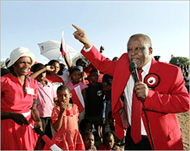Incumbent favoured in Botswana polls
Botswana President Festus Mogae’s ruling party is expected to cruise to victory as voters in one of Africa’s richest and most stable democracies go to the polls, hoping for more of the same.

Mogae’s Botswana Democratic Party (BDP) has won every vote since independence in 1966 – victories supported by a government record which has often left the fractious opposition with little to oppose.
“I think the BDP will win,” 25-year-old student Pako Peter in the capital Gaborone said. “Most people will vote for them because they’re used to it. It’s more by habit than anything else.”
Dismissed as a worthless piece of the Kalahari desert by its former British rulers, sparsely populated Botswana now has one of Africa‘s highest gross domestic product per capita thanks to the export of diamonds.
The elections are scheduled for 30 October.
High marks
Botswana regularly gets high marks for governance with Africa‘s highest credit rating and programmes to channel diamond revenues into education and healthcare.
It was also the first African country to provide life-prolonging anti-retroviral drugs free to people with HIV, leading the charge against a devastating regional AIDS epidemic that has left other governments scrambling.
 |
|
Victory for Mogae (R) is likely to |
When Mogae retires in 2008 before elections in 2009, having served his statutory 10-year-term, his successor is expected to be current vice president and former army chief, Seretse Khama Ian Khama, Seretse Khama’s son.
A victory for Mogae – an Oxford-trained economist with experience at the International Monetary Fund and a firm favourite of the United States – is likely to please foreign investors and much of the population.
“Botswanans today have opportunities that simply didn’t exist 30 years ago,” said Botswana-born Razia Khan, now an economist with Standard Chartered Bank in London. “Economically speaking, the government has done very well.”
But unemployment in Botswana has risen and is now officially 20% – although analysts say it may well be more – as agricultural workers move to the urban centres. These urban unemployed are seen as the opposition’s best long-term hope.